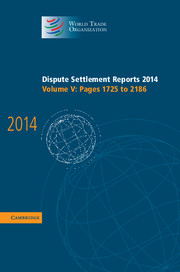United States - Countervailing Measures on Certain Hot-Rolled Carbon Steel Flat Products from India (WT/DS436): Report of the Appellate Body
Published online by Cambridge University Press: 28 September 2017
Summary
INTRODUCTION
India and the United States each appeals certain issues of law and legal interpretations developed in the Panel Report, United States – Countervailing Measures on Certain Hot-Rolled Carbon Steel Flat Products from India (Panel Report). The Panel was established to consider a complaint by India with respect to the imposition, by the United States, of countervailing duties on certain hot-rolled carbon steel flat products from India.
Panel Proceedings
India challenged two types of measures related to the imposition by the United States of countervailing duties on imports of certain hot-rolled carbon steel flat products from India, namely: (i) the relevant legislation; and (ii) the specific determinations leading to the imposition of countervailing duties. First, India brought claims against certain provisions of the United States Tariff Act of 1930 (US Tariff Act) as codified in the United States Code, Title 19, Chapter 4, Subtitle IV (US Statute), and of the United States Code of Federal Regulations, Title 19, Volume 3, Chapter III, Part 351 (US Regulations). Second, India challenged several measures related to the United States’ original investigation initiated in December 2000, the 2002, 2004, 2006, 2007, and 2008 administrative reviews, and the 2006 sunset review. For both these types of measures, India also challenged their amendments, replacements, implementing acts, or any other related measure in connection with them. The measures at issue in this dispute are set forth in greater detail at paragraphs 2.1 and 2.2 of the Panel Report.
India claimed that the US measures were inconsistent with several of the obligations under the Agreement on Subsidies and Countervailing Measures (SCM Agreement), the General Agreement on Tariffs and Trade 1994 (GATT 1994), and the Marrakesh Agreement Establishing the World Trade Organization (WTO Agreement). These obligations pertain to the determination of the existence of a subsidy, specificity, initiation of investigations, evidence, requirements for consultations, calculation of benefit, determination of injury, imposition and collection of anti-dumping duties, review of countervailing duties, and public notice requirements.
- Type
- Chapter
- Information
- Dispute Settlement Reports 2014 , pp. 1727 - 2160Publisher: Cambridge University PressPrint publication year: 2016
- 1
- Cited by



